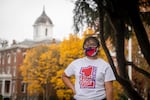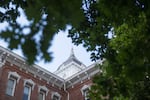“I wanted to at least go into college thinking I knew some things about it, but in reality I really didn’t know anything about how college life was going to be,” recalled Karina Alcantara Guerrero, a third-year student at Linfield University.
Alcantara Guerrero went to a high school in Portland that she says was pretty racially diverse. So, she said, enrolling at Linfield — which is about 64% white – was a bit jarring. On top of that, being the first person in her family to go to college meant she wasn’t familiar with the culture on campus.
She said she can’t imagine what starting at the private university in McMinnville would have been like without the First Scholars program — a program focused on supporting first-generation student success.
“It definitely helped me not be afraid of asking questions, because that was a fear I had as a first-gen student,” she said.
First Scholars pairs incoming first-generation students with student and employee mentors. It also awards students with scholarships based on financial need throughout their time at the university. Linfield defines first-generation students as students whose parents did not complete a four-year college degree.

Karina Alcantara Guerrero is a third year student at Linfield University. She's a mentor and coordinator with the First Scholars program — a program focused on helping first-generation students succeed. She says the program helped her during her first year at the private university.
Courtesy of Karina Alcantara Guerrero / OPB
Alcantara Guerrero was in the first cohort of the program, which is now in its third academic year. In her third year at Linfield, Alcantara Guerrero is a student coordinator for the program and a mentor herself.
Without being in the program her first year, she said, her experience at Linfield would have probably looked very different.
“I definitely feel like it would have been a lot more difficult,” Alcantara Guerrero said.
First-generation students at Linfield make up 34% of the total campus population. For first-year students this fall, that percentage is even higher — 42%.
Along with scholarship funding and providing first-generation students with mentorship, First Scholars also gives students year-round activities and meet-ups. And new students attend a specialized orientation a week ahead of the beginning of the school year.
First-generation students are automatically enrolled in the program before their first year, but they can opt out of it if they wish.
The program received a Beacon Award earlier this month — an annual award from the Northwest Commission on Colleges and Universities, or NWCCU, the region’s main accrediting body for postsecondary institutions. Linfield was one of three recipients, winning in the category of institutions with fewer than 2,000 students.
NWCCU President Sonny Ramaswarmy says the Beacon Award recognizes institutional accomplishments related to student success. Specifically, there must be tangible evidence of student achievement, and whatever the program or plan is, it should be possible for other institutions to follow suit.
“We want our institutions to be able to replicate the wonderful work that Linfield has done,” Ramaswarmy told OPB. “It’s really a multi-pronged approach to be able to make sure that the students are being successful.”
The retention rate for first-generation Linfield students is currently about 80%, on par with students whose family members have completed college.
Linfield does not have retention rates available for first-generation students before the program, but it says over the past five years first-generation students were regularly graduating at a rate of about 54%. That compares to a 61% graduation rate for all students, during the same time period.
Those numbers are similar to what Oregon’s higher education system is showing. According to data from the Oregon Higher Education Coordinating Commission, the state college completion rate for non-first-generation students last academic year was 62%. For first-generation students, the rate was 51%.
Linfield administrators expect the graduation rate for first-generation students to increase substantially once members of the initial cohort of the First Scholars program begin graduating in 2023.

Pioneer Hall is seen through the signature oak trees at Linfield College in McMinnville, Ore., Tuesday, May 21, 2019. Pioneer Hall is the oldest building on the Linfield campus, constructed in 1881.
Bradley W. Parks / OPB
Linfield’s associate vice president of student success and retention Gerardo Ochoa is one of the program’s creators and leaders. He was a first-generation college graduate himself.
“In a lot of spaces, in higher education, they were not designed for people of color, for first-gen students; they were not designed for women. So many times, we as administrators have to really deconstruct the way higher education happens for people who were intentionally kept out,” Ochoa said. “We have to re-envision how education is going to happen for the new demographics of students.”
Ochoa said the pandemic interrupted the pilot year of the program — which began in fall of 2019 — causing many meetings to either happen in limited numbers in-person or online.
Still, the program worked to provide students with networking and friendship-building, things Ochoa said are crucial to help new first-generation students avoid “cultural mismatch,” basically culture shock.
Ochoa said first-generation students often thrive in an interdependent culture, “where you’re co-collaborating with family and friends, elementary teachers — you do things as a team, and together.”
However, he said, many colleges and universities operate under an independent culture, where students are expected to figure things out on their own.
“I really want us, as an institution, to work towards having a student-ready university rather than having university-ready students,” Ochoa said.
Linfield student Alcantara Guerrero said she definitely felt that cultural mismatch during her first year, but the First Scholars program helped to alleviate it.
“In the first-gen program, there were a lot of [students of color], and that really helped me because we were able to create a support system for each other, and that’s where I met a lot of my close friends,” she said.
Alcantara Guerrero said she wants other colleges and universities to consider similar programs, “because it does make a difference.”
That’s something Linfield President Miles Davis had in mind as well, being a first-generation college student himself.
Davis said he hopes the First Scholars program receiving a Beacon Award will encourage other institutions to make moves to support first-generation students, beyond just recruiting and enrolling them.
“What do you want to do to meet those students where they are? Which is what Linfield is doing,” Davis said. “We’re not saying, ‘Ok, you’re just going to be coming to our institution, you’re going to conform to all the things we’ve always done,’ because I can guarantee you, they will not retain those students.”
Davis says having new first-generation students connect with other students, staff and faculty members who are also first-generation is crucial.
“You need to make sure that you have people that are at your institution that can speak to the lived experiences of the people who you’re bringing in,” he said.





